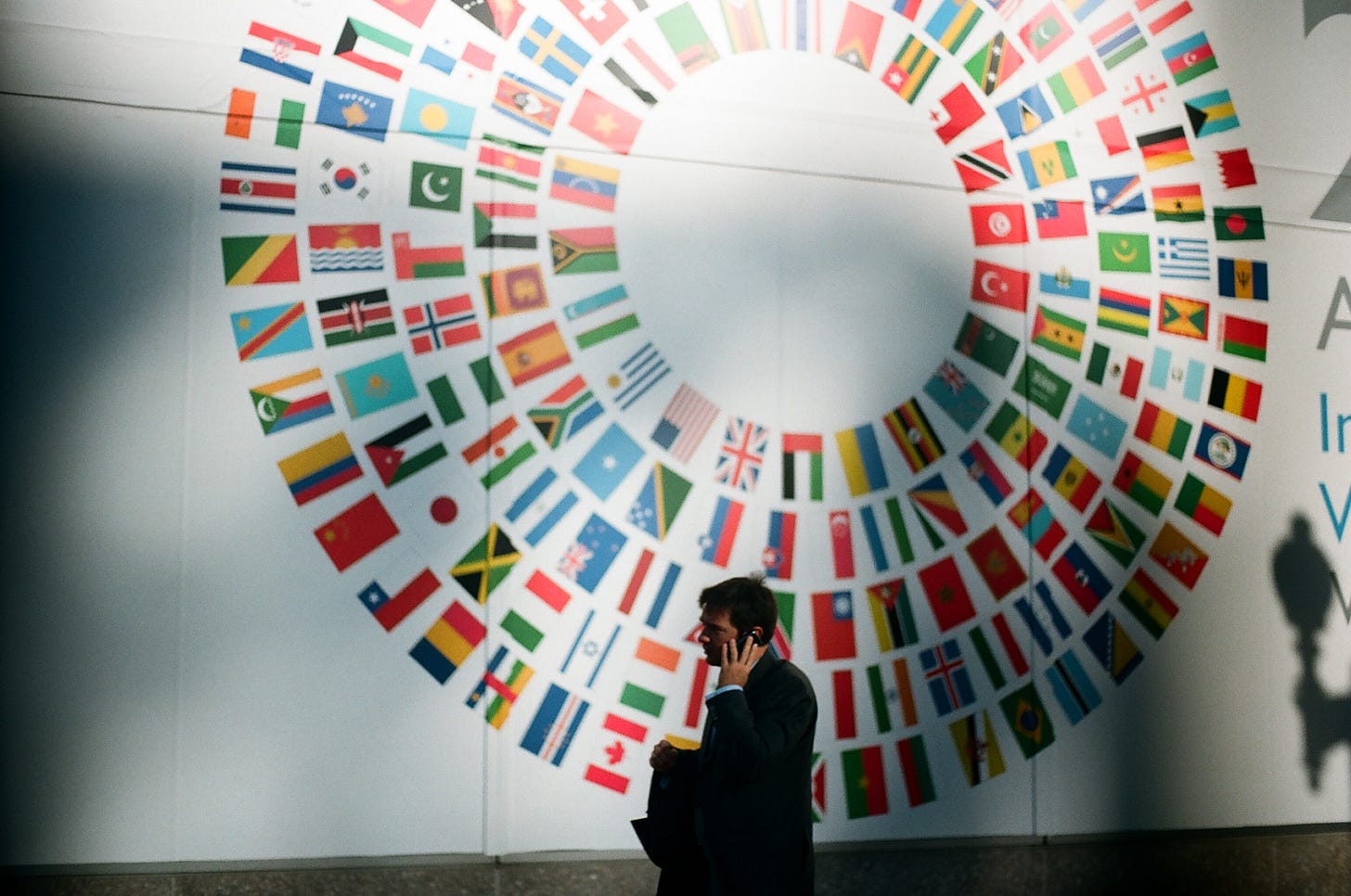Economic development and financial crisis management are hard enough
The IMF and World Bank should stay in their lane
Photo by Markus Krisetya on Unsplash
Hello,
Welcome to Known Unknowns, a newsletter about institutions that should stay the same and people who need to change.
Meetings are back!
The IMF/World Bank meetings were last week. And in some ways, they’ve never felt less relevant. These institutions exist to foster economic cooperation, promote growth, and reduce financial instability. The Depression and World War II were painful reminders that when countries don’t cooperate, everyone is poorer and there’s less stability.
And, for a while, the Bretton Woods framework seemed to work. But now, the bigger economies are turning inward: less trade and more industrial policy—the very things these institutions were supposed to prevent. In a better world, the IMF/World Bank would rise to this challenge and remind the world why this is bad economic policy. But they are not doing that, instead, they are pivoting to climate. I think that’s a mistake.
Don’t get me wrong; I think climate is a problem that also requires more cooperation. In fact, I think it is such a big deal it merits its own international organization dedicated to climate. But this is not the job of the Fund or the Bank. Or maybe they could take this if they had already achieved their original mission. But they haven’t. Many countries are still poor, others still have a balance of payment crisis, and the world’s economies are turning inward and pursuing nationalist policies. We have a possible credit crunch that could cause all kinds of trouble and create a serious reckoning about the state of monetary policy. Now is not the time to shift to other priorities.
It is also notable that the IMF just declared that soon rates and inflation will return to pre-pandemic normal. No one seems to believe them. It reminds me of when I was at Davos this winter. I heard a thoughtful Indian businessman argue that inflation would be higher because of structural changes to the economy. I thought he made a good argument. Maybe you disagree, but it was based on his observations from working in markets, and it is an argument that deserves consideration. But then a senior IMF official laughed lightly and said, “You are wrong. This is Economics 101. Central banks are saying 2% and they can set inflation wherever they want.”
It was a cringe moment. I can only assume the patronizing tone was because the official knew the businessman was right, but they could not admit it. Or they are hoping that if everyone expects the world to go back to normal, it will. Instead, it sounded out of touch. Any time you invoke Economics 101, it is not a good look, and in the history of inflation targeting, when has a central bank ever made its target?
Between the shift to climate and still using Neo-Keynesian models without a meaningful financial sector and outdated parameters to make macro projections, the Washington institutions are risking their credibility and relevance. The IMF should be helping countries to prepare for a world where inflation and rates could be higher or more variable. This will be especially challenging for developing countries that will seek their guidance. What is going on there? Get it together, World Bank/IMF.
AI-proof your career
I welcome our robot overlords. Maybe computers will one day enslave or kill us all, or maybe, like every technology before it, they will just make us richer and life a little easier. I know, it is different this time because computers will be smart. But a power loom also seemed like a threat to humanity many years ago.
But no matter what the future holds, rather than fight it, which is futile, I say embrace it and figure out how you can be useful. That can mean composing monetary policy haikus on Chat GPT or rethinking how we approach education. If the past is an indication of the future, big new technology tends to come for the mediocre first. So, it is critical to add some human element and be good at it. I anticipate that in-person skills will be super valuable and so will knowing how to think.
LLM solves problems based on current writing and data. But that is actually somewhat limiting. If the technology will change the world, then the old data won’t be so useful when it comes to telling us things about the future. The ability to solve novel problems and the wisdom to know what data is useful will be very important; critical thinking skills will command a big premium.
And for that reason, I hope humanities will come back into fashion. With rising tuition costs, I can see why more students want a more vocational curriculum that gives them skills that translate into a job right out of school. But vocational skills can be easily replaced by technology. Staying relevant also means thinking well and constantly adapting and learning. Ideally, we’d combine vocation and humanities. Say history majors also learn marketing and nurses and engineers also read some Plato. Also, even if Chat GPT can do it, learn to write well—it forces clarity of thought and the formation of good arguments.
Colleges and universities have largely fallen down on this job, with grade inflation and easier standards, which discourage curiosity and learning. But hard classes are still offered—you just have to be really motivated and tolerate ambiguity sometimes. That is true for life in general, too.
Until next time, Pension Geeks!
Allison



